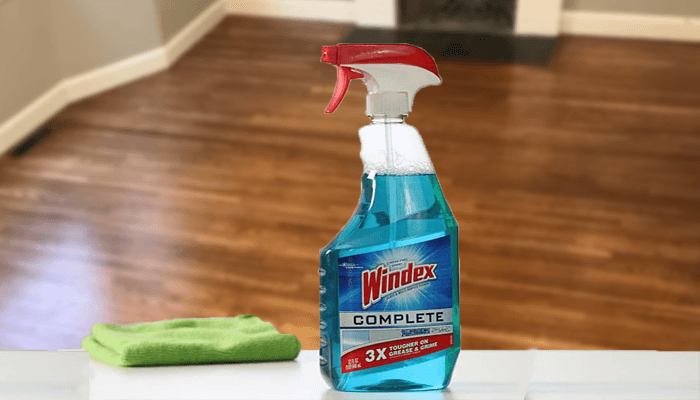Hardwood floors are what dreams are made of. The classic, royal and luxurious vibe to it come only from the real wood. No engineered hardwood floor or wood-look porcelain or vinyl tile can come close to it. It can only compensate a bit in terms of price and look as well as durability. However, just with a close look, you know it’s not wood. When it is not wood, the charm wanes.
So, when a hardwood floor is so precious, products to maintain it, make it last and keep it neat and polished will be more than welcomed. However, not all products are meant to clean a hardwood floor. When plain water can ruin a hardwood floor, you know it needs handling with utmost care.

Contents
Cleaning Tools and Solutions
Hardwood floors are advised to dry clean with a vacuum. Dusting and dry mopping regularly, that’s it. Some steam mops are specifically designed to mop hardwood floors. You have a ton of cleaning solutions available in the market for removing stubborn stains. But hardwood floors cannot handle harsh chemicals.
You cannot even use those to clean the sticky mess or residue from the wood floor. It is a surface where you walk, keep things, and spill mess. So, it is bound to get dirty, which is hardly cleaned through dusting and dry mopping. For such stubborn dirt, you need to use something extra, perhaps a liquid solution.
Windex Glass Cleaner
That something extra, in our opinion, is Windex(Check on Amazon). We all know Windex as an effective glass cleaner only. It is albeit a chemical solution but a great one.
Eventually, the brand has made a cleaning solution where the main ingredient is vinegar. There is another one where alcohol and ammonia are the main ingredients.
But what most of you might not know is Windex has a non-ammonia based cleaning solution too. This one is perhaps the safest yet the most effective cleaning solution for cleaning the hardwood floors.
Can I Use Windex on Hardwood Floors
Many of you have a common query related to this top-rated cleaning product, Windex. Can I use windex on hardwood floors? The answer depends on which one you are using.
When it comes to cleaning the floor, it is either the ammonia-based or the ammonia-free Windex. And in the case of hardwood floors, it is only the ammonia-free Windex because it’s universal and doesn’t contain harsh ammonia high in acidic pH.
Ammonia-Free Windex
Ammonia-free Windex, as we already stated, is mild on the hardwood floor compared to others but very active on the wax buildup and stains. It is streak-free and doesn’t leave footprints too.
The best thing about it is it doesn’t need to be mixed with water to dilute it. You can directly spray it on the buildup and scrub the area with a microfiber pad or cloth.
Make sure to vacuum the surface before spraying Windex on it. Please do not leave it for too long by spraying Windex all over the house.
Clean one spot at a time. Spray and clean. Use ammonia-free Windex once a month, not more than that.
Ammonia-Based Windex
Ammonia-based Windex is a great cleaning product. It removes the toughest of stains and residues with ease. But you cannot and should never directly use it on the hardwood floor.
The harshness of the acidic pH in ammonia ruins the sheen of the hardwood and makes it dull. It causes discoloration of the surface too. Therefore, it is not recommended to use on hardwood floors.
However, if you are still willing to use it to clean the hardwood floor, there is a process. So, how can you use it then? Of course, in a specific domain, when needed, only after diluting it by mixing it in water.
It is very effective on waxy residue. No other cleaning solution removes wax buildup so well, like ammonia-based Windex does, not even the ammonia-free Windex. So, if you can work faster, it’s a great solution to clean the wax buildup.
A Glass Cleaner On Floor
It sounds bizarre that out of all the chemical solutions, we suggest a glass cleaner for cleaning your floor. But trust us when we say Windex works as effectively on a hardwood floor like it works to clean a glass window and mirror.
The motive is to have a streak-free, gentle cleaner, especially when it comes to cleaning a hardwood floor. Because neither you can wet mop it, nor is regular floor disinfectant safe to use on it.
Even the ammonia-based cleaning solution by the same brand proved to be harsh on hardwood floors and suggested only to use in a small area. That too, once in a while on stubbornness of stains.
So, the best bet is to have the mildest chemical possible. And the ammonia-free Windex glass cleaner is what we recommend to you. It works.
Regular Use of Windex
It’s a heads up not to mop the wood floor regularly with Windex. None of the versions. Not even by diluting it with water. Water itself is a nemesis, and mixing Windex where ammonia and alcohol are the two main ingredients, is a classic case of inviting trouble.
A small amount of Windex sprayed on specific areas with sticky residue, or wax buildup is all you can do if you want to try it on a hardwood floor. Even that also you need to clean as soon as possible if it’s the ammonia-based one.
You can relax a bit if it’s ammonia-free, but you still need to make sure you have cleaned the residue thoroughly. Even an extra drop of Windex and an extra minute of it sitting and soaking the hardwood will damage the floor within.
Windex glass cleaner allows universal use. If a glass cleaner can be used to clean hardwood floors, it can be used on every other surface as well. So, a bottle of Windex will save you from using multiple cleaning solutions to clean multiple surfaces. Make sure to follow our suggestion in case you Windex on hardwood flooring.

